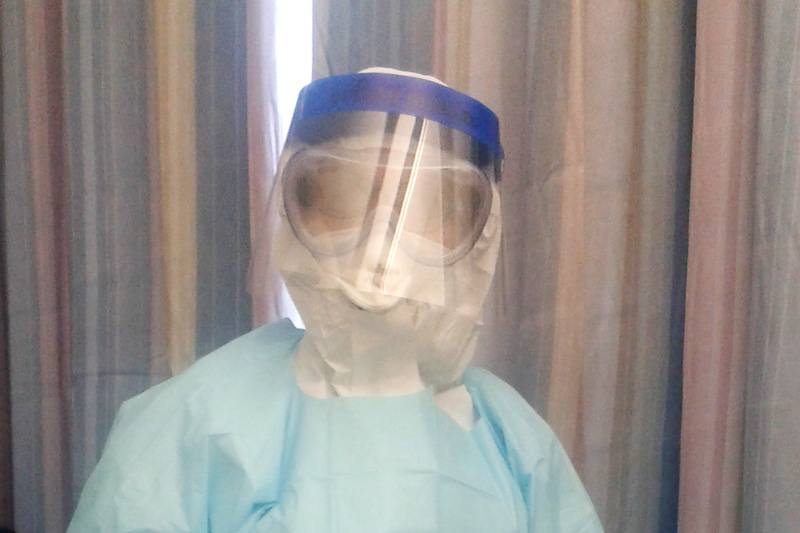What happened when I was suspected of having Ebola

I recently returned from Sierra Leone, where Keystone’s Ground Truth programme is providing real-time feedback from the general public and frontline workers on the Ebola response. The good news is that the data are being used by decision-makers in the response to improve programming. The bad news is that exactly one week after returning from Sierra Leone, I was surrounded by doctors in biohazard suits, being tested for Ebola myself.
It started with a headache, a deep pounding painful rhythm, not unlike the feeling the morning after the night before, but this was no ‘red wine head’. By the afternoon a wave of malaise had washed over me, my stomach was cramping, a fever setting in, and it was with a bizarre sense of ‘surely not?’ that I dug out the information given to me by Public Health England upon my return to the UK a few days before. The protocol in such situations is to call a non-emergency helpline, which I duly did. I talked them through my symptoms and recent travel history and it wasn’t long before I was talking to a senior consultant, who was making arrangements for an ambulance to come and collect me.
At this point, let me say that I did not have Ebola. I knew I was a low risk case, but as I sat alone waiting for the ambulance to arrive, it was hard not to consider all possibilities. Within a few hours two men in full biohazard suits escorted me out my front door, no doubt giving any on-looking neighbours quite a shock. It was the start of a very strange 48 hours – my very own Hollywood disaster movie – full of needles, isolation and bleary eyes behind steamy goggles and masks.
In some ways, my experience was not uncommon, and follows a similar pattern to that of thousands across West Africa in the last year or so. At the same time, however, my experience was so totally different that I couldn’t help coming away with even greater respect and empathy for those in West Africa who are on the front lines – both as patients and as staff – fighting this indiscriminate disease.
It is hard to describe the feeling of remoteness and isolation you experience when you cannot even see the face of the person who is trying to help you, desperately trying to search through the foggy mask to catch their eye, straining to hear them talk underneath all the layers. It is unnerving and almost dehumanising, and it gave me the briefest of insights into how so many people in West Africa have felt of late. That said, it was only the briefest of insights, and I can in no way compare the isolation room I was in – with en suite bathroom, electrically adjusted bed and a team of nurses on call – to the realities on the ground in Guinea, Liberia or Sierra Leone. When I was in Freetown, it was easy to sit in meetings and talk about the need to listen to those affected by Ebola, but having just lived a tiny snippet of what so many people in Sierra Leone have experienced, it confirmed for me that listening and acting on what they say is crucial to the success of the Ebola response.
While it was no picnic for me, surrounded by faceless spacemen, it was certainly not much better for the doctors and nurses around me. Until I had myself witnessed a nurse struggling to stick a needle in my arm with three pairs of gloves on, condensation running down the inside of his mask, desperate to just rip it all off, I did not give much thought to how they feel. Until my test results came back negative, they were – by their own choice – putting themselves at risk, without complaint or protest. After taking my blood, administering various drugs, even serving me my dinner in these hot and uncomfortable protective suits, they would patiently begin the complex 30-minute doffing procedure. I felt for them – and for those doing the same in much more challenging surroundings. I was just one patient, and a relatively healthy one. There were no pools of bodily fluids – and the hospital was well resourced and equipped.
After working for the last 4 months on trying to bring the voices of those most affected by Ebola to the decision-making table, the shoe was momentarily on the other foot. And while I did not walk a metaphorical mile in those shoes, I did take a few small steps. Not only did it confirm my huge respect for those fighting Ebola on the front lines, it also focused my attention on the next battle. I am confident that the Ebola epidemic in West Africa will be beaten, perhaps not soon, but it will be stopped. When that time comes will the international community breathe a sigh of relief and congratulate itself on a job well done, or will we roll up our sleeves for the longer and equally challenging fight to rebuild the region’s decimated health system?
